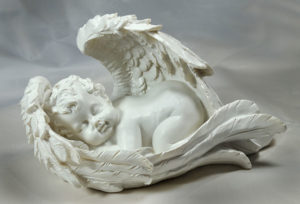Creating a ceremony & naming your baby are two ways to help remember your baby
It is important to give this little one dignity by giving him or her a name. This also aids the grieving process because it helps us to acknowledge the baby as a person. We cannot recommend this strongly enough. If you feel you cannot choose a name as you don’t know what sex your baby was, try using one that applies to either sex. Often women have a strong feeling they know the sex of their baby and who is to say they are wrong?
Seeing your baby
The Miscarriage Support Group believes it is extremely beneficial to see your baby where possible. Most miscarried babies look quite normal, but are small for the length of time carried. Even when the baby is deformed, seeing it is not the gruesome experience you might think it will be.
Unfortunately, not all parents who want to see their baby are able to. In about 60% of early miscarriages the baby’s form may not be recognisable. The foetus is either too small to be found, or there wasn’t one there at all (afoetal pregnancy). Sadly, because miscarriage is so messy, it is common for many miscarried babies to be passed while using the toilet.
Ceremony suggestions
For some people finding acceptance is about a “desire to let go and move on”. For others it is after they have found a new way to live, a re-establishment of their personal reality. Eventually, through healthy grieving, there does comes a day we can look back and think “I have not felt sad today” or “I have not felt that awful empty pain inside me for a while”. We are able to laugh and look forward again without feeling guilty. We can think about things other than our loss.
To help you deal with your grieving process in a healthy way, we recommend a farewell ceremony and as there are often no baby remains available, it is very healing to view your miscarriage similarly to other family deaths.
It can help too, to create your own personal commemoration in a way that reflects on what your baby meant to you, adding significance to their life and death.’ Also, think about others who have lost this baby. It would be especially true for a baby that would have made first time grandparents, aunts and uncles but also close friends who might be grieving with you. Perhaps ask if they would like to be included in a small ceremony if you can be comfortable with that. It’s never too late to do this. Sometimes a miscarriage has happened years before and at the time you would not have thought anything was appropriate but it doesn’t matter. Even if it is only you, do something that has a healing influence on your old grief. There is a seat at Eden Gardens dedicated to Miscarriage which you might find helpful to sit on and contemplate your loss. (Burial options in New Zealand – Remembrance Areas) We are all different so whatever works for you is fine.
You will eventually find a place of peace and acceptance. The timing is different for everyone. You may find comfort in the following ceremony suggestions:
- Having a formal funeral service involving a minister, priest or a funeral celebrant.
- Having a less formal gathering in an appropriate setting, by the sea or in a park or somewhere with a comforting family association. Or gather around a candle to read a piece which is significant to you, e.g. the Bible, poetry or even something you wrote yourself.
- Or a small commemoration service (even just a glass of wine) on one of the anniversary dates or the 15th October on World Baby Loss Day.
- See our ‘Certificate of Acknowledgement for the brief life of – – – – – ‘ for downloading
- Bury a message with flowers.
- Send flowers or pine cones out to sea or perhaps a message in a bottle.
- Scatter seeds in the wind.
- Place a message on or in a balloon and release it somewhere special to you.
- In all cases play music that feels comforting to you, which can also be a source of healing.
Or perhaps just do something by yourself and perhaps your partner which is significant:
- Buy a special piece of jewellery; locket, charm, necklace, keychain or birthstone ring.
- Write a letter or poem to your baby or keep a diary of that time.
- Make a tape (it’s strange, but hearing your own words of grief is quite healing).
- Creating a ‘memory box’ for cards, ribbons, dried flowers, a toy or other mementos.
- Create your own website.
- Use the internet to find a baby memory site
(This is a compilation of suggestions from several sources including the Wellington Miscarriage Group’s old website)
What happens to the baby’s soul?
We approached a number of people e.g. ministers, to contribute to this section and found the answer was so vast we couldn’t do it justice here. However, if you don’t already have a philosophy which includes an answer to this question, we encourage you to find your own. Here is one person’s experience:
As a teenager and young adult, unlike my friends who wanted two children, I thought six would be a good size for a family. Eventually I did have six but miscarried the first three, naming them David, Rose and Elisabeth. Having always believed that human beings have souls that live on after our physical death, I was concerned about my children’s souls. However unbidden, a sense of great peace comes over me whenever I think about them, and a feeling that they are in a safe place being well looked after. Lacking a better explanation, I wondered vaguely if this might be heaven as in the Bible. In the years since I have become a Christian and feel it must be, and am delighted that my experience matches what I have since read.






